New York City, April 1, 2013
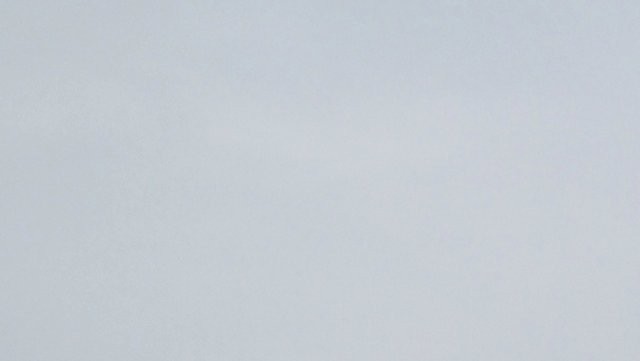
★★ The early sun was brightish but on a dimmer, and a chillier-than-expected breeze pushed up the avenue. Over the mouth of the subway exit, the sky was white and hard to look at; the spires of downtown, City Hall and the Gehry luxury tower and the rest, shaded away in the enchanted glow of their various fairytales. Flecks of light glittered on the asphalt-caked scoop of a backhoe parked expectantly at the curb. By late afternoon, the sky was not so much raining as it was dripping. Water crept up to darken the hems of a woman’s flowing, poppy-colored pants. Up in the 60s, the dimmer was turning the other way, clearing and brightening ahead of sundown. A draft came in under the apartment door, where the uncooperative weatherstripping had peeled loose yet again.
How Much Do BuzzFeed, Gawker and Business Insider Staff Tweet About Work?
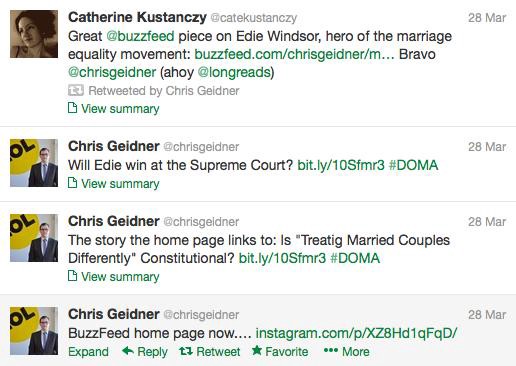
Is Twitter your job? We have maintained in the past that it is not. A year later, we think that more and more media employees are engaged in the practice of using their Twitter accounts to promote not just their work, but their workplaces. That’s true even with the transition of Jim Roberts from @NYTJim to @NYCJim, as he left the New York Times to become the executive editor of Reuters Digital. (His Twitter is still chock-full of Times links, though!)
How much Twitter work is working? We looked at a work-week’s worth of tweets at three publications: BuzzFeed, Gawker and Business Insider. Just how often were people promoting their workplaces?
For the five work days of last week, March 25th-29th, we used this methodology: we only counted “public-facing” tweets — leaving out conversational replies and the like. We counted three things:
• all tweets
• all tweets containing a link to any publications owned by the tweeter’s employer
• all employment-related tweets. (We erred on the side of under-inclusion here, but counted things like employees referring followers to other Twitter accounts run by the publication, such as during the launch last week of a new BuzzFeed vertical, and also some self-referential office humor.)
And we included retweets.
Let’s look at the data!
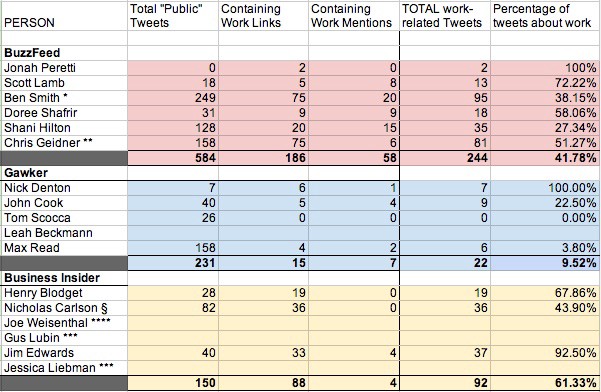
Notes:
*** Doesn’t really use Twitter, or doesn’t at all.
**** I could not review Joe Weisenthal’s Twitter, it would take me a week.
§ Spent that Friday golfing.
What did we learn?
• As a general rule, the higher up the masthead you are at a digital publication, the less you tweet.
This could mean a few different things of course. More meetings, more travel, less time to tweet. It could also mean a lack of pressure to tweet. In general it’s best not to draw conclusions from this. But the ratio of tweets by editors-in-chief or owners to executive editors and senior editors is impressive.
• The most frequent tweeter last week, unsurprisingly, and breaking that model, was BuzzFeed honcho Ben Smith.
He issued 249 public-facing tweets in five days. With that much volume, however, only 38% of his tweets were about work, and he linked to a diverse array of sources as well. Still, with that volume, he easily tweets 18 or 20 links to BuzzFeed a day. Although, to be fair, having to not include Business Insider’s Twitter-monster Joe Weisenthal may make this a hollow victory.
• Owners tweet less but link much more.
Gawker owner Nick Denton and BuzzFeed CEO Jonah Peretti tweeted more infrequently than average last week. But each managed to have 100% of their public-facing tweets be about their publications. (And nearly all were links: in one single Tweet, of Denton’s, he conveyed not a link but a reference to a publication). Henry Blodget only linked to Business Insider in 67% of his tweets — but he tweeted significantly more than the other two.
• Business Insider takes work-tweeting very seriously…
In general, Business Insider — which has a somewhat smaller sample size here — had a significantly higher ratio of publication promotion than Gawker and BuzzFeed. Nearly 2/3rds — more than 3/5ths — of Business Insider tweets contained links to the publications.
• … while Gawker does not.
Gawker’s top masthead — Nick Denton, plus that publication’s editor-in-chief, deputy editor, associate editor and news editor — only contained Gawker-related links or conversation just fewer than 1 in 10 times. When Denton’s 100% twitter ratio is removed, however, that percentage drops to 8.77%. (That’s even despite Gawker editor John Cook’s fairly decent 22% Gawker-related tweet ratio.)
• Strange synchronicities.
Gawker’s news editor Max Read and BuzzFeed’s senior politics and legal report Chris Geidner issued the exact same number of public-facing tweets last work-week: 158 each. But their approach was markedly different. Geidner tweeted links to BuzzFeed stories an astonishing 75 times. That’s fifteen each day. Max Read tweeted four links to Gawker — in total. #YOLO
• What does it all mean?
Quite possibly nothing! Employees with lots of Twitter followers are valuable to publications, obviously. Employees who know how to tweet are as well. Sharing in general is valuable. It’s also interesting that a number of employees show up near the top of mastheads who barely tweet at all. They’re bringing other value, presumably. The outlook would be a lot more disturbing if 100% of employees were tweeting work-related content regularly. That some aren’t means that we don’t yet live in a world where work performance on your “personal” twitter is mandatory, and that’s a good thing.
The full data:
Teenagers Quitting Facebook Because It's Full of Old People

Teenagers are idiots. They listen to 40-year-old music like Led Zeppelin or the New York Dolls, they dress like those old dudes from The Strokes, and they will never have jobs because of robots. But in one respect, today’s teenager is much like the previous century’s teenagers: They do not like socializing around their dumb parents and weird uncles and Tea Party Jesus-freak aunts. Because all of those creepy segments of adult society spend all their time on Facebook, the kids have finally figured out that Facebook is not at all cool.
Facebook management admits in new corporate filings that they’re losing the teen market to competitors that don’t suck so hard. And some local teens down at the mall say this is true:
Francesca Patterson, 17, says she doesn’t like Facebook anymore. “I go on it every day, but maybe for like five minutes every day,” says Patterson. “There’s a lot of pop-ups on Facebook and ads everywhere, and you see your parents’ status updates and older people’s things that just aren’t funny and you just don’t care about them.”
Experts say the next retro thing today’s teens will do is “urban terrorism” like the Symbionese Liberation Army. At least they won’t be getting diabetes looking at the Facebook all day.
VICE Is Coming To HBO
by Awl Sponsors
https://www.youtube.com/watch?v=X51rPtxmd3Y
The VICE crew has a new show coming to HBO that will shine a light on the absurdity of the modern condition. It’s hosted by Shane Smith, so you can expect things like out-of-control political assassinations in the Philippines, precarious nuclear stare-downs in Kashmir and coverage of the sumo craze sweeping Senegal. The first episode premieres this Friday, April 5, at 11 PM.
Spoilers, Screenerbrags and Squabbles: How Film Critics Use Twitter
by Jane Hu
Venn diagram review of “LA RELIGIEUSE” and “VIC+FLO ONT VU UN OURS” #Berlinale twitter.com/szacharek/stat…
— Stephanie Zacharek (@szacharek) February 10, 2013
This year, the Tribeca Film Festival hosted a conversation between Will Leitch and Dana Stevens on how social media — and Twitter specifically — has affected the work of film criticism. On the subject of sharing thoughts after screenings, Leitch emphasized that he has always set aside time for reflection after a film instead of rushing into forming an opinion, while Stevens jokingly remarked that, for professional critics, pre-tweeting before a review feels like “stealing from yourself.”
In light of the conversation, Indiewire surveyed a dog-pile of critics, asking, “Do you tweet after screenings? Why or why not? And are critics in general too quick to tweet their thoughts after screenings?” While the question framed post-screening tweets as potentially hazardous, many critics were firmly pro doing so. Josh Spiegel of Sound on Sight, for example, doesn’t “totally agree that being pithy about a film on Twitter will automatically make a full review pointless. It all depends on the person writing the tweet and review; hopefully, that person wouldn’t rely on one witticism to make their review stand out.”
But opinions range. As Luke Y. Thompson of Topless Robot explains: “I’m very old-school about this, a function of having started at print media, I think. My belief is that when an employer pays you for a review, one of the things they are paying you for is the privilege of being the forum in which your opinion is first publicly stated.” Here we get to the big questions about labor and money, between when you’re on the job and when you’re off, a line that’s become increasingly blurred. Clearly for some critics, Twitter remains still more work than play. When one’s role on social media is inseparable from one’s job — especially jobs centered on promoting opinions about other forms of media — it seems wise to pause and ask: How hard should a critic “work” on Twitter?
When I emailed Will Leitch to talk about movie critics and Twitter, he replied that the medium of Twitter doesn’t seem “suited to talking about much of anything. I think there is too much going on in a movie — too much going on anywhere, anything — to have much of a serious conversation about it on Twitter.” Meanwhile, Dan Kois (also of Slate) seemed to see this same frenzied mad-capness about Twitter as a plus: “I would say that I find the film-critic Twitter world extremely vibrant and informative, and think that the critics who do tweet are creating a pretty amazing community of thinkers and writers and arguers and trolls and jerks and geniuses.”
It’s still emerging but so far we’ve identified some categories of how movie critics currently use Twitter (one category: be Bret Easton Ellis).
I. TWEETING THE SCREENING EVENT
In that Tribeca conversation with Leitch, Stevens suggested that tweeting during a screening was akin to a humblebrag, “a conferral of social value on that person for having been present at that event.” (I’ve recently noticed the use of “screenerbrag” in relation to TV screeners, like with Matt Weiner’s heavily spoiler-guarded “Mad Men.”) When I emailed Stevens about this point, she noted that it “often happens at film festivals, and I think I’m not alone in despising festival tweets. It’s not that there can’t be great tweetage from a festival — see Stephanie Zacharek’s Venn-diagram tweet from the last Berlinale — but these recurring waves of ‘just got out of the new Malick and boy is it X’ festival tweets tend to sound to those of us in less glamorous places a lot like ‘Bonjour, I’m in Cannes and you’re not.’”
As someone who’s not a movie critic, I had supposed people saw festival tweets as actually more acceptable than the regular ol’ preview screening. Wasn’t tweeting from a film festival, in a way, part and parcel of being there? Stevens had a point though, especially when Vines and Instagrams of lines and celebrity sightings begin to clog one’s feed. She’s also right, that the only pictures I want to see are those of Zacharek’s Venn-diagrams (shown above).
Festival tweeting, however, might come to exemplify what tweeting at critics screenings are all about. That is, they’re as much about the film in question as the setting in which the film is viewed. Screenings give critics a chance to capture the singularity — the event-ness — of that viewing, which is, in a way, a nice nod to the culture of moviegoing.
Sometimes these tweets communicate mostly through being suggestive.
SIDE EFFECTS has some extremely interesting conditions on its screening invite. I’m just saying.
— Linda Holmes (@nprmonkeysee) January 15, 2013
Technological malfunctions, especially, are noted…
Spider-man screening now an hour late — digital drive malfunctioned, theater manager apologized. “In the days of film, this wouldn’t happen.”
— Dana Stevens (@thehighsign) July 2, 2012
… and remembered long after the fact.
@ania_tee 15 minutes into a 35mm screening of Vicki Cristina Barcelona in NY, a projector broke & couldn’t be fixed; they sent us home.
— Richard Brody (@tnyfrontrow) October 1, 2012
Here we see: Twitter is just one form of new media by which to talk about the failures of other, often older, media.
If press screenings are a way to gauge box office reception, then tweeting the demographics of your audience is a way of conveying data without losing too much nuance. 140 is just enough characters to give a short data soundbite, as demonstrated by Carrie Rickey of the Philadelphia Inquirer:
98 percent of audience @ “Think Like a Man” screening is female.
— Carrie Rickey (@CarrieRickey) April 10, 2012
Even if coming from a biased tweeter (and not a critic), screening observations might have the power to drive potential viewers even if it’s simply an observation of the audience’s level of excitement.
End of Watch screening was breathtaking; audience response was INTENSE. Congrats to Jake, Michael, David Ayer. I’m proud to be part of it.
— Anna Kendrick (@AnnaKendrick47) September 9, 2012
Of course, the distance between a film festival screening and its later reception can differ widely, as we might quickly learn from following film critics on Twitter. Karina Longworth of LA Weekly notes in a tweet that it’s “always interesting to see extreme reactions at high altitude to certain films that played middling in screening rooms in LA.”
Tweets are also opportunities to give paratextual information about a particular screening that didn’t make its way into the review proper. Wesley Morris of Grantland publicizes his article, while simultaneously couching it with bonus information:
I failed to mention that Cloud Atlas’s public screening reportedly ended with a long standing ovation, which I get: b.globe.com/SyoS0K
— Wesley Morris (@Wesley_Morris) September 10, 2012
In response to this tweet, Amanda Katz of the Boston Globe said:
@wesley_morris Obviously what we need around here is an Applause Critic.
— Amanda Katz (@katzish) September 10, 2012
… and as it currently stands, that handle is free for the taking.
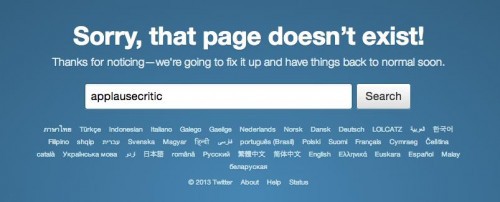
Even if not dispensing critical opinion or insight on a film, screenings aren’t off limits for the witticisms so congenial to Twitter. Sometimes an event, any event, is just a vehicle for making jokes.
At a screening of the new Clint Eastwood vehicle, which I have officially retitled (for my inner self’s amusement) Trouble w/ the Chair.
— Dana Stevens (@thehighsign) September 18, 2012
At MUCH ADO P&I screening, guy in front of me looked at his cell phone, then his iPad, then walked out. (Was his laptop next?) #TIFF12
— Scott Tobias (@scott_tobias) September 13, 2012
My AMOUR screener stopped working halfway through and I can’t get a new one but I bet everything works out OK for those crazy kids
— Dan Kois (@dankois) December 17, 2012
Even New Yorker critics are not against punning.
Ozu the Great and Powerful.
— Richard Brody (@tnyfrontrow) March 19, 2013
II. FIRST STATEMENT OF OPINION (BUT NOT LAST!)
I remember witnessing the multiple trials NYC film critics underwent in their attempt to watch The Master. Stevens was shut out twice.
Seriously, there are pastoral nomads blogging from the Mongolian steppes who will have seen and reviewed The Master before I have. — Dana Stevens (@thehighsign) September 13, 2012
Frustrating as it must have been, Stevens’ struggle to see The Master was its own sort of experience for her followers, even on those instances when she wasn’t able to access a screening. In the end, Stevens saw the film not once, but three times and produced two reviews, the latter of which “issue[s] a full-throated defense of the act of rewatching.”
The Master is a formally inventive, aesthetically dazzling, rich & dense film. Just don’t ask me (yet) what it’s about: slate.com/articles/arts/…
— Dana Stevens (@thehighsign) September 15, 2012
I still can’t believe my loony-tunes enabler of an editor, @swansburg, let me go back and review The Master a 2nd time: slate.com/articles/arts/…
— Dana Stevens (@thehighsign) September 22, 2012
The initial review observes the remote detachment of The Master as more intellectual than feeling-based; but in Stevens’ second encounter, the film became “palpably physical… there were images and scenes that stayed with me for days afterward.” While she notes that a third viewing might not bring her any closer to deciphering the puzzle structuring the film, scenes “that had seemed inscrutable on the first go-round blossomed into sense.” Stevens’ reviews remind us that moviegoing is a process — that opinions evolve, and are interesting and meaningful when they do.
Stevens’ series of dispatches are significant in acknowledging the changes critical thought can undergo. In that Indiewire survey, Jordan Hoffman of Film.com noted that first blush reactions are wont to alter: “I’ve reversed my opinion between the time of the post-screening afterglow and actually writing my review more than once.”
Other times judgment can subtly shift without direct acknowledgment.
After Michael Phillips of the Chicago Tribune attended a screening of The King’s Speech at TIFF, he tweeted with effusive praise:
Waves of love greeted the gala Toronto screening of “The King’s Speech” (sterling perfs from Colin Firth and Geoffrey Rush). A treat.
— michael phillips (@phillipstribune) September 11, 2010
His review published the day after this tweet was similarly enthusiastic, if also prescient: “If Firth and Rush aren’t nominated for Academy Awards early next year, I’ll be plenty surprised — and in the case of Firth, plenty disappointed.”
As always, time and distance from Phillips’ tweet, his review, Hooper’s film, and the 2012 Oscars — when the perfectly agreeable The King’s Speech took home Best Picture — will show how well the Applause Critic’s initial observations stand. But two months after his first review, Phillips himself was cooling on the film, as his official review for the Chicago Tribune will attest. Whether due to distance or clarity, or both, Phillips had grown more measured and restrained in his response, even if still overall commendatory: “Some aspects of the film feel routine, or facile, or too heavily underlined. Certain performers (Timothy Spall as Winston Churchill most glaringly) fly straight past character into caricature.” Was it the critical eye settling in, or the metaphorical fog that stays long after the literal one that accompanies us to our cars post-screening.
Sometimes, though, that feeling of being gutted after seeing a film stays with you, as evinced by Wesley Morris’s screening tweet about Maïwenn’s Polisse:
I just saw Maïwenn’s “Polisse,” which is like SVU The Emotional Musical. What a movie. I’m officially awake now.
— Wesley Morris (@Wesley_Morris) May 12, 2011
His review that followed weeks after carries the same lively, affective expressions of that tweet, while incorporating all the critical observations to back them up. You’ll feel the immediacy of Morris’ opinion in the opening paragraph: “Yes, ‘Polisse’ is the sort of cop thriller where people do things like angrily bang on a desktop or sweep everything off it. If it happens once, it must happen six times. But every time it did, I wanted to stand up and cheer, which I’ve never wanted to do for any such thriller.”
Perhaps it’s easier to write a review about a film one so actively enjoys, but as a reader, to sense that buzzing quality of engagement sustained beyond a tweet is what reading a critical endorsement is all about.
III. THE ISSUING OF CRYPTIC VERDICTS
The cryptic tweet usually communicates enough so that you know whether the critic liked, disliked, or found the film interesting, which is to say the cryptic tweet doesn’t say much. As James McCormick of Criterion Cast admits in his Indiewire response, he “might tweet out a slightly coy tweet” to allude to his feelings “depending on how much I loved the film I have seen or how much I have hated it.” Regardless, these vague and fleeting notes are a way of avoiding spoilers or mini tweet-reviews, while also giving your followers notice that a certain film is on your radar.
NPR’s Linda Holmes is wonderfully cryptic in her verdicts even when explicitly not trying to be coy.
I’m not trying to be coy when I say I liked ZERO DARK THIRTY significantly less than some and significantly more than others.
— Linda Holmes (@nprmonkeysee) January 10, 2013
Same goes for her TV tweets.
Huh. #newgirlscreener
— Linda Holmes (@nprmonkeysee) January 28, 2013
But a cryptic verdict should not be confused with the cop-out verdict.
When publicists call for a reaction after a press screening, I tend to blurt out a weird “Haha… it was interesting?!” that pleases no one.
— Alison Willmore (@alisonwillmore) November 29, 2012
(To be fair, this is a terrible practice, the post-screening publicist call. What on earth is the critic supposed to say?)
IV. “I HAVE A NEW REVIEW UP” AND OTHER FORMULA TWEETS
While the wonderful and renowned Roger Ebert is on Twitter, and continues to blog, his tweets about recent movies largely stick to the formula of: “This is a review of X .” Mostly, Ebert uses his feed to share things he finds interesting — from the Russian Alien Car to Bengal tigers to Facebook’s introduction of hashtags — and, of course, his regular New Yorker caption contest entries.
Though it happens less and less now, sometimes we are gifted with a gem, such as this one.
Clint, my hero, is coming across as sad and pathetic. He didn’t need to do this to himself. It’s unworthy of him.
— Roger Ebert (@ebertchicago) August 31, 2012
Or this one.
Actually, one of the best presidential debate moderators would be David Letterman, who is quick, smart, and interrupts bullshit.
— Roger Ebert (@ebertchicago) October 5, 2012
Recently, though, there was this charming reminder of what happens when Twitter malfunctions.
What? I can’t log into Twitter??? This is a test. 🙁
— Roger Ebert (@ebertchicago) February 23, 2013
Todd McCarthy has not tweeted for awhile, but we count him in this camp as well.
Zero Dark Thirty: Film Review j.mp/YeZHlr
— Todd McCarthy (@ToddMcCarthy) November 25, 2012
V. PLAY & ENGAGEMENT
My favorite film tweeters are those who don’t make much of a distinction between work and play on Twitter. As David Haglund has already noted, New Yorker film critic Richard Brody is just such a tweeter, open to experimentation and engagement. Brody’s “online perch gives him the freedom to approach movies at an angle,” writes Haglund, “rather than writing straight reviews — but even if he was doing those, I suspect his takes would still be more surprising and illuminating than nearly anyone else’s.”
Recently, Brody wrote a simple tweet that could be essentially reduced to two negligible facts — except by pairing them together, Brody inspired a counterfactual alliance between two individuals of classic film history that are usually otherwise never spoken of in the same critical conversation, not to mention tweet.
Eric Rohmer, né Maurice Schérer. Rock Hudson, né Roy Harold Scherer, Jr.
— Richard Brody (@tnyfrontrow) March 22, 2013
Brody is a classical music and opera enthusiast (writing and tweeting wonderfully on the topic), but this doesn’t cause him to refrain from tweeting about Kanye (nothing should stop a person from tweeting about Kanye).
Until I read up, I thought that Gotye picked that name as a parody of Kanye.
— Richard Brody (@tnyfrontrow) February 11, 2013
Still, I love when Brody tweets about classical music, and especially when he brings it someway back to film.
Hearing Britten’s Simple Symphony pizzicati on @wqxr and thinking of Moonrise Kingdom.
— Richard Brody (@tnyfrontrow) January 8, 2013
These tweets are the miniature version of something like his Django, Unchained review, where Brody observes the “Wagnerian strain in the recent cinema.”
Like the most generous critics on Twitter, Brody not only makes insightful observations about film (new and old), but engages with readers. Chatting with him over email is no difference — his generosity shows, as does his true consideration over the role of the critic on social media:
Twitter is terrific for friendly debate until it degenerates into a donnybrook because the brevity of a tweet often makes a phrase come out as curt or pugnacious. But the overall thing about Twitter is that a good thought — or a good question — can usually be expressed in a not-too-long sentence or two and the quasi-public nature of it gets people in touch with each other. I’ve had really stimulating virtual meetings on Twitter and even the fights end up in handshakes; the level of film criticism today is, I think, higher than ever, and the exchange of ideas by way of Twitter is a not-coincidental factor.
Twitter exchanges that verge on the side of argumentation, but end in conviviality or understanding, seem truly an artform, and many people don’t come near to pulling it off. It means condensing tone, content, and wit in a confined space during a lively, often speedy, exchange that, more often than not, becomes an exercise in testing and transforming one’s opinion — and all in public.
Brody’s interaction on Twitter doesn’t hinge on the idea that tweeting is work. Instead, he’s integrated Twitter as a way of interacting with life more generally, such as cozy tweets about Seder dishes or about his children — whether screening related or cutely Kafkaesque:
And when, every now and then, I think to myself, “ah, I haven’t tweeted in a while,” it’s also a kind of reminder that I’ve been buried too deep in work and need to surface, listen to a little music, read a newspaper, take a walk, and post something that catches my interest.
Sometimes not tweeting inspires us to get going, and sometimes tweeting reminds us to go to bed.
Having just tweeted to myself along with my friends, I’ve proven the need to get some sleep.
— Richard Brody (@tnyfrontrow) January 13, 2013
VI. RETROACTIVE TWEETING OF CLASSIC REVIEWS
Twitter is already an archive system for critic’s tweets, but what if it started archiving critic’s impressions retroactively?
@dwightgarner @thehighsign I’ve been trying to do Kael. She’s tough in 160 characters, though. But maybe I’ll try.
— Wesley Morris (@Wesley_Morris) June 19, 2011
I also like the idea that new, fast media doesn’t necessarily have to work in commenting on new culture (nor that these opinions are necessarily timely or sloppy). Hasn’t film, in a way, always been about the viewer’s desire for nostalgia?
My first screening when I moved to Chicago full time in ’99: EYES WIDE SHUT. Ebert, Rosenbaum, Wilmington in attendance. The big time.
— Scott Tobias (@scott_tobias) January 5, 2013
VII. BRET EASTON ELLIS AT THE MOVIES
Apparently everyday audience tweets are now included in advertising campaigns, but my favorite celebrity film tweeter continues to be Bret Easton Ellis. Is this perhaps the platonic BEE tweet?
As a fan of Don DeLillo and David Cronenberg I think that Cosmopolis works even though the Academy screening last night suggested otherwise.
— Bret Easton Ellis (@BretEastonEllis) August 28, 2012
Ellis can also wax nostalgic.
We were almost kicked out of an early critic’s screening of The English Patient because we were giggling so much. New York 1996. Happiness.
— Bret Easton Ellis (@BretEastonEllis) December 4, 2012
And here’s Ellis on film and pleasure.
For some reason while grinning through the adolescent jingoism of Olympus Has Fallen I realized I liked it a lot more than Zero Dark Thirty.
— Bret Easton Ellis (@BretEastonEllis) March 27, 2013
It’s possible that he tweets after every screening, firmly opinionated, as we’d expect him to be.
The screening of Michael Haneke’s riveting “Amour” left me in a foul mood. It contains the most symbolic pigeon I’ve ever seen in a movie…
— Bret Easton Ellis (@BretEastonEllis) October 3, 2012
Not that it really matters but there was zero love for “The Dark Knight Rises” at the packed Academy screening in Los Angeles tonight.
— Bret Easton Ellis (@BretEastonEllis) July 22, 2012
He even lists his walk-outs, a privilege most critics working in journalism don’t allow themselves.
The 2013 Walkouts so far: Oz the Great and Powerful, Stoker, A Good Day To Die Hard, A Glimpse Into the Mind of Charles Swan the III…
— Bret Easton Ellis (@BretEastonEllis) April 1, 2013
VIII. NOT IN CLASS PICTURE
These are only loose categories, of course — and likely to change along with how we interact on Twitter (Branch activity informs us that, this week, we’re suspicious of the hashtag #howdoyouhashtag [this is in no way a jab, or a subtweet #subtweet #hashtag]). To tweet or not to tweet after screenings aside, some film critics abstain from the medium completely. Anthony Lane has enough wit for Twitter, but so far he hasn’t joined. (Neither has David Denby.) Is it that the bigger a critic’s reputation, the less they need rely on (or experiment with) new media platforms? David Edelstein blogs regularly at NYMag, but he’s not on Twitter. Neither are J. Hoberman, Dave Kehr, Peter Keough, Stuart Klawans, Andy Klein, or radio interviewer extraordinaire Elvis Mitchell. It’s tempting to read a line of old-school formalism (not uncommon with film criticism, just ask the academics!) into this, but really I’m curious as to how Manohla Dargis’ wonderful reviews would change if she were to become more public and start communicating through tweets (God, what would she use as her avatar?).
***
As a rule of thumb, the newer the film, the more concern over when and if and how it’s appropriate to have public exchanges about them. Regarding the post-screening debate that started all this, Brody is hesitant to be prescriptive:
I tend not to tweet about films after screenings because a new film that’s not yet a familiar item or known quantity needs something more than a few words even to introduce it. If I were tweeting solely to the community of other critics who have seen the film, it might be fine; but since tweets are read by the public (and that’s something that, in the enthusiastic or heated give-and-take of Twitter discussion, it’s sometimes easy to overlook), I’d rather keep first words for a fuller consideration. On the other hand, I don’t think there’s an issue of morality or ethics involved; some critics may be more concise or clearer about their thoughts and impressions than I am.
I largely agree with Brody that morality seems irrelevant to the act, though it is possible that post-screening tweets might actually be more deleterious for reviewers than for one’s general readership. Stevens, for instance, makes a point of not reading any reviews before seeing a movie, especially if she’s planning to write on it. As she tells me:
Even getting one adjective stuck in your brain can affect a viewing experience — instead of asking, “whoa, what’s with the sudden shift in tone?” you think, “Oh, this must be the destabilizing dream sequence so-and-so tweeted about.”
The avoidance of prior influence would prove difficult for critics on Twitter who likely follow other critics there, and spoiler-warning culture seems related to the viewer’s desire of achieving an independent experience of the film. More information about a film — even if about atmosphere or quality, rather than its actual events — threatens foreclosure.
While critics, as most people, might and certainly can change their mind on a film, the fact of being a critic online is that your public opinions, be they tweets or reviews, will always be attached to your status as a professional reviewer. As Stevens writes, “I also find the mania to tweet out a concise, formed opinion of a movie right after seeing it — especially if you’re about to get the chance to write on it at length — sort of offputting.” The key here, then, isn’t so much that a tweet is always too concise and dashed off to be of use, but that “if you’re about to get the chance to write on it at length,” do the potential pros of post-screening tweets outweigh the cons?
You might also enjoy: A Short History Of Book Reviewing’s Long Decline
Jane Hu is a Twitter critic and a critic of Twitter. You can follow her here.
New Race of Sexually Mature Children Not Really Having Much Sex
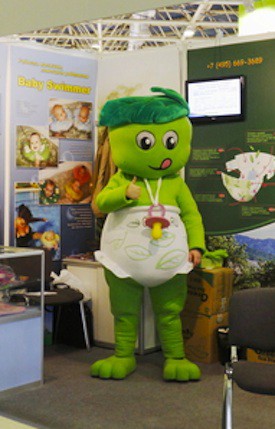
Because of hormone-injected factory chicken corpses, radiation, gamma rays, vaccines, TV violence, Angry Birds, gay marriage, the Internet, Batman, sexting, the abandonment of religion, suburbs, diabetes and “writing for free,” many children of 10 or 11 years old are gigantic sexually mature super-humans. These terrifying creatures try to sit at child-sized desks in elementary schools, but they’re already taller than the teachers and also have bigger boobs. What to make of this new race of sex monsters?
Not much, experts say. We should just back away and let them do what they want — and “what they want” appears to not really be a lot of sex-humping, according to a calming new study.
A new study published online on April 1 in Pediatrics reveals that only 0.6 percent of 10-year-olds, 1.1 percent of 11-year-olds and 2.4 percent of 12-year-olds have had sex. The rates have stayed similar for decades. Over the last 50 years, no more than 10 percent of girls have had sex by the age of 14.
The rate is 80% for altar boys, however. Anyway, this isn’t a problem anymore, so don’t worry about it. Also stop thinking about it, because that is gross.
Photo by nikshor via Shutterstock.com.
The Flaming Lips And Bon Iver, "Ashes In The Air"
The Flaming Lips And Bon Iver, “Ashes In The Air”
https://www.youtube.com/watch?v=u956sRK5bxI
Do you remember on “Mork & Mindy” when Mork and Mindy had a baby but it turned that aliens from Mork’s planet were born old and then aged backwards so the baby was played by 56-year-old Jonathan Winters? The new Flaming Lips video is like that. It’s pretty excellent. But, like most Flaming Lips videos, it’s gross and disturbing, especially at the end, so be forewarned.
Football Stadium Won't Be Named After Prison Profiteers (This Time)
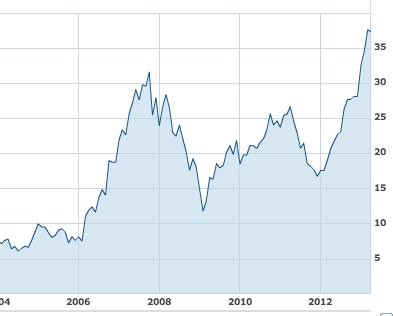
Privatized prison operator GEO Group has withdrawn its foundation’s proposed $6-million gift to Florida Atlantic University. Students apparently did not feel comfortable with the naming rights attached to the gift, which would have put GEO’s name on their sports arena. GEO has been desperately trying to keep its Wikipedia entry clean of a rehash of all the deaths and charges of abuse that took place in its prisons, but unfortunately for them, Wikipedia knows how to resist such things and also, if there’s one thing college students know how to do, it’s “read Wikipedia.”
GEO Group’s stock was up 12 cents this morning, reaching its highest prices since the firm went public. Year over year, the stock has climbed from $19 to over $37. Have a nice day!
